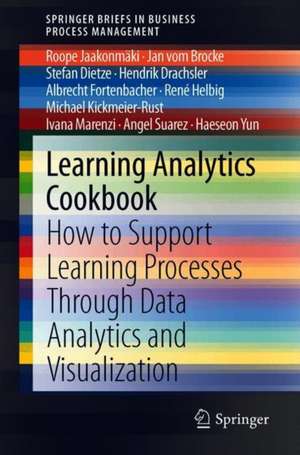Learning Analytics Cookbook: How to Support Learning Processes Through Data Analytics and Visualization: SpringerBriefs in Business Process Management
Autor Roope Jaakonmäki, Jan vom Brocke, Stefan Dietze, Hendrik Drachsler, Albrecht Fortenbacher, René Helbig, Michael Kickmeier-Rust, Ivana Marenzi, Angel Suarez, Haeseon Yunen Limba Engleză Paperback – 20 iun 2020
Preț: 476.79 lei
Nou
Puncte Express: 715
Preț estimativ în valută:
91.25€ • 94.91$ • 75.33£
91.25€ • 94.91$ • 75.33£
Carte tipărită la comandă
Livrare economică 14-28 aprilie
Preluare comenzi: 021 569.72.76
Specificații
ISBN-13: 9783030433765
ISBN-10: 3030433765
Pagini: 91
Ilustrații: XI, 91 p. 67 illus., 54 illus. in color.
Dimensiuni: 155 x 235 x 11 mm
Greutate: 0.16 kg
Ediția:1st ed. 2020
Editura: Springer International Publishing
Colecția Springer
Seria SpringerBriefs in Business Process Management
Locul publicării:Cham, Switzerland
ISBN-10: 3030433765
Pagini: 91
Ilustrații: XI, 91 p. 67 illus., 54 illus. in color.
Dimensiuni: 155 x 235 x 11 mm
Greutate: 0.16 kg
Ediția:1st ed. 2020
Editura: Springer International Publishing
Colecția Springer
Seria SpringerBriefs in Business Process Management
Locul publicării:Cham, Switzerland
Notă biografică
Roope Jaakonmäki holds a PhD on Enterprise Content Analytics from the University of Liechtenstein. His dissertation focused on scrutinizing the utility of unstructured content by applying a mix of analytics methods, with a focus on unstructured content extracted from social networking sites. His research has been published in JEIM, ICIS, and HICSS. Currently he is employed as an IT Project and Process Manager for an international company in the manufacturing industry.
Jan vom Brocke is Professor of Information Systems, the Hilti Chair of Business Process Management, Director of the Institute of Information Systems, and a Fellow of the Association for Information Systems. His research focuses on business process management and related aspects of digital innovation and transformation. He has published, among others, in MISQ, JMIS, JIT, EJIS, ISJ, Communications of the ACM, MIT Sloan Management Review, and Management Science. He has held various editorial roles and leadership positions in Information Systems research and education.
Prof. Dr. Stefan Dietze is full professor for Data and Knowledge Engineering (DKE) at Heinrich-Heine-University (HHU) Düsseldorf,scientific director of Knowledge Technologies for the Social Sciences(WTS) at GESIS and affiliated member of the L3S Research Centre (Hannover, Germany). Stefan’s research interests are at the intersectionof Information Retrieval, NLP, Knowledge Graphs and Machine Learning to enable search, use and interpretation of Web data, for instance, in thecontext of online learning. Stefan Dietze has published more than 175research papers in top-tier-venues such as WWW, Neurocomputing, SIGIR,CHI or ISWC and is frequent member in international programme andorganisation committees, for instance, currently as general chair of CIKM2020.
Hendrik Drachsler is Professor of Educational Technologies and Learning Analytics and affiliated with the German Leibniz Institute for International Educational Research (DIPF), the Goethe-University Frankfurt am Main, and the Open University of the Netherlands.His research interests include Learning Analytics, Personalisation, Recommender Systems, mobile devices, and their applications in the fields of Technology-Enhanced Learning and Health 4.0. Hendrik has regularly chaired international scientific conferences (e.g. LAK16, ECTEL17, LAK2020) and is Special Issue Editor of the Journal of Computer Assisted Learning (JCAL). He authored over 150 research articles on Technology-Enhanced Learning.
Albrecht Fortenbacher is professor for computer science at HTW University of Applied Sciences Berlin, where he heads the research group Technology Enhanced Learning. His research interests include learning analytics and sensor-based learning.Albrecht Fortenbacher is co-speaker of the work group „learning analytics“at the German Society of Computer Science (GI).
René Helbig is a member of the research group Technology Enhanced Learning headed by Albrecht Fortenbacher. His main focus is on microservice applications, application interfaces, microservice environments, the process of migrating monolithic application to microservices, learning analytics and machine learning (KI).
Michael Kickmeier-Rust holds a PhD in Cognitive Psychology. He is an expert in educational technologies, in particular intelligent educational systems, learning analytics, and serious games. Currently he is professor for educational assessment at St. Gallen University of Teacher Education, Switzerland.
Ivana Marenzi is senior researcher at the L3S Research Center of the Leibniz University of Hannover, Germany. She obtained her PhD on the interplay between Content and Language Integrated Learning and Web 2.0, which was published in 2014 (Multiliteracies and e-learning2.0, Vol. 28. Peter Lang, Frankfurt). Her main area of research in Technology Enhanced Learning includes the support of collaborative and lifelong learning, as well as studies on the relationship between technology and communication.
ÁngelSuárez holds a PhD on Technology Enhanced Learning obtained at the Open University of the Netherlands in 2017. His PhD focused on the design, implementation and testing of innovative tools and strategies to improve the support of Inquiry-based Learning with technology in secondary education. His research has evolved into the development of DojoIBL, an online cloud-based platform that enables flexible support and structures inquiry processes. Ángelis a fellow of the Dutch research school information and knowledge systems (SIKS). Since 2018, he is working as a Software Engineer and a Product Manager for a FinTech startup in London.
Haeseon Yun is a PhD researcher in the areas of educational technology and learning analytics, with the specific research interests in self-regulated learning, adaptive learning system, sensor based learning and human-machine interactions.
Caracteristici
Presents a concise yet essential introduction to the most important aspects of learning analytics Introduces hands-on approaches to implementing learning analytics in the classroom Provides software tools and guidance on a range of learning analytics scenarios




